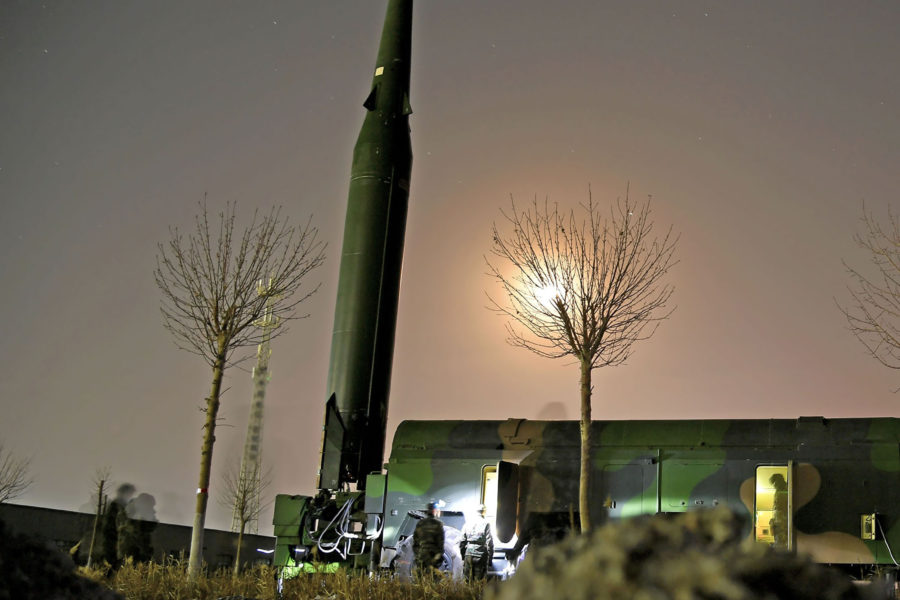Earlier this week, the People’s Republic of China confirmed it is halting its nuclear arms control talks with the U.S., in retaliation for the U.S. continuing to sell arms to Taiwan. The move reinforces a “pattern of behavior” from Beijing, experts say.
“A part of their goal is to link the Taiwan issue to other issues that Washington views as important,” Brian Hart, China Power Project Fellow at the Center for Strategic and International Studies, told Air & Space Forces Magazine. “Essentially, they’re saying ‘the U.S. and China can’t make progress on issues of strategic or national importance without addressing Taiwan.’”
A similar situation unfolded in the wake of then-House Speaker Nancy Pelosi’s visit to Taiwan in August 2022; Beijing cut off a number of areas of dialogue and engagement, including key areas of military-to-military engagement.
“It took a lot of effort to rebuild some of those areas of dialogue,” says Hart.
China has long avoided nuclear arms talks with the U.S. and Russia. Despite Russia suspending discussions with the U.S. last year, Washington continued to pursue bilateral engagement with China to prevent misunderstandings. Discussions with Beijing gained traction in the last few months as both nations engaged in semi-official consultations.
Now, however, progress is stalled.
Apart from using Taiwan as an excuse, China perceives such negotiation as constraining itself without achieving a level of parity with other major nuclear powers like the U.S. and Russia, said Daniel Rice, a China military and political strategy subject matter expert at the Krulak Center for Innovation and Future Warfare. Beijing avoids committing to weapons agreements to gauge not only a “temperature read” of the foreign relations, but also prevent itself from being disadvantaged when engaging on the topic, said Rice.
“It provides them just more flexibility in the way that they approach their military modernization,” Rice said. “In terms of nuclear buildup, China wants to have its own autonomy in decision making. Having a formal agreement, if it ever reached that point, would fundamentally limit Beijing’s options by essentially handcuffing itself to an international, or at least a bilateral agreement on those matters.”
China’s rapid advancements in nuclear power has been a significant concern for the U.S. and its allies. The Pentagon estimates China could possess more than 1,000 operational nuclear warheads by 2030, many of which will be deployed at readiness levels. Last week at the NATO summit, the alliance warned of Beijing’s expansion and diversification of its nuclear arsenal, pointing to “more warheads and a larger number of sophisticated delivery systems” and urging China to engage in strategic risk reduction talks.
The current weapons count isn’t a major concern for U.S. defense leaders, as Washington holds about 3,700 nuclear warheads, compared to Beijing’s estimated 400 warheads. But with their substantial investment in nuclear weapons, the Chinese aspire to achieve “a greater level of parity with Washington and Moscow, so that it could also make decisions and engage on these issues from a position of greater strength and somewhat equality,” said Hart.
Now, with both China and Russia refusing to negotiate measures to constrain the nuclear arms race, experts are concerned. On top of that, tensions remain high across the Taiwan Strait, as China eyes to bolster its arsenal so that it has a “greater leverage in the event of a Taiwan scenario,” according to Hart.
This underscores the critical modernization of Washington’s nuclear triad.
“The way we counter these threats is through deterrence, and it must be backed up with a credible force,” Jennifer Reeves, Senior Fellow of Mitchell Institute for Aerospace Studies, said. “We have no ability to have this conversation if we are not seen as a credible threat. This country must recapitalize its nuclear enterprise, and do it as quickly, swiftly, and as competently as possible. This has been languishing for 30 years.”
The Pentagon’s ongoing effort to modernize the nuclear triad includes acquiring 100 B-21 bombers to replace legacy B-1s and B-2s by the 2030s, and procuring the land-based Sentinel intercontinental ballistic missile to replace the aging Minuteman III. Despite cost overruns, Sentinel survived a Department of Defense review and received a green light to proceed earlier this month—which Reeves stressed “our only option at this point.”
Following China’s decision to discontinue talks, the State Department said the PRC’s approach “undermines strategic stability and increases the risk of arms race dynamics.”
“But we, the United States, will remain open to developing and implementing concrete risk-reduction measures with China,” spokesperson Matthew Miller said.
A Chinese Foreign Ministry official said China stands ready to maintain talks with Washington on international arms control but demands that the U.S. “must respect” China’s interests in Taiwan.
